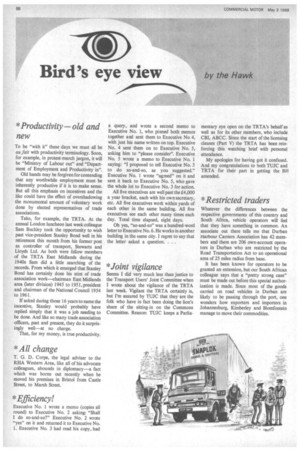Bird's eye view
Page 90

If you've noticed an error in this article please click here to report it so we can fix it.
by the Hawk *Productivity— old and new
To be "with it" these days we must all be au fait with productivity terminology. Soon, for example, in protest-march jargon, it will be "Ministry of Labour out" and "Department of Employment and Productivity in".
Old hands may be forgiven for contending that any worthwhile employment must be inherently productive if it is to make sense. But all this emphasis on incentives and the like could have the effect of overshadowing the monumental amount of voluntary work done by elected representatives of trade associations.
Take, for example, the TRTA. At the annual London luncheon last week colleague Sam Buckley took the opportunity to wish past vice-president Stanley Bond well in his retirement this month from his former post as controller of transport, Stewarts and Lloyds Ltd. As both were fellow members of the TRTA East Midlands during the 1940s Sam did a little searching of the records. From which it emerged that Stanley Bond has certainly done his stint of trade association work—chairman East Midlands area (later division) 1945 to 1951, president and chairman of the National Council 1954 to 1961.
If asked during those 16 years to name the incentive, Stanley would probably have replied simply that it was a job needing to be done. And like so many trade association officers, past and present, they do it surprisingly well—at no charge.
That, for my money, is true productivity.
*All change
T. G. D. Corpe, the legal adviser to the RHA Western Area, like all of his advocate colleagues, abounds in diplomacy—a fact which was borne out recently when he moved his premises in Bristol from Castle Street, to Marsh Street.
*Efficiency!
Executive No. 1 wrote a memo (copies all round) to Executive No. 2 asking: "Shall I do so-and-so?" Executive No. 2 wrote "yes" on it and returned it to Executive No. 1. Executive No. 3 had read his copy, had a query, and wrote a second memo to Executive No. 1, who pinned both memos together and sent them to Executive No 4, with just his name written on top. Executive No. 4 sent them on to Executive No, 5, asking him to "please consider". Executive No. 5 wrote a memo to Executive No. 1 saying: "I proposed to tell Executive No. 3 to do so-and-so, as you suggested." Executive No. 1 wrote "agreed" on it and sent it back to Executive No. 5, who gave the whole lot to Executive No. 3 for action.
All five executives are well past the £4,000 a year bracket, each with his own secretary, etc. All five executives work within yards of each other in the same building. All five executives see each other many times each day. Total time elapsed, eight days.
Oh yes, "so-and-so" was a hundred-word letter to Executive No. 6. He works in another building in the same city. I regret to say that the letter asked a question. . . .
*Joint vigilance
Seems I did very much less than justice to the Transport Users' Joint Committee when I wrote about the vigilance of the TRTA last week. Vigilant the TRTA certainly is, but I'm assured by TUJC that they are the folk who have in fact been doing the lion's share of the sitting-in on the Commons Committee. Reason: TUX keeps a Parlia mentary eye open on the TRTA's behalf as well as for its other members, who include CBI, ABCC. Since the start of the licensing clauses (Part V) the TRTA has been reinforcing this watching brief with personal attendance.
My apologies for having got it confused. And my congratulations to both TUJC and TRTA for their part in getting the Bill amended.
*Restricted traders
Whatever the differences between the respective governments of this country and South Africa, vehicle operators will feel that they have something in common. An associate out there tells me that Durban Harbour Carriers Association has 42 members and there are 206 own-account operators in Durban who are restricted by the Road Transportation Act to an operational area of 25 miles radius from base.
It has been known for operators to be granted an extension, but our South African colleague says that a "pretty strong case" must be made out before this special authorization is made. Since most of the goods carried on road vehicles in Durban are likely to be passing through the port, one wonders how exporters and importers in Johannesburg, Kimberley and Blomfontein manage to move their commodities.




































































































































































































































